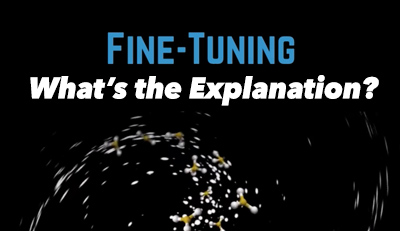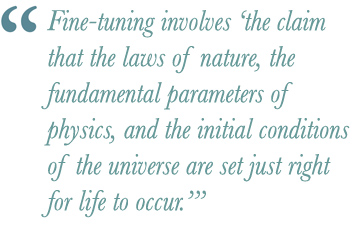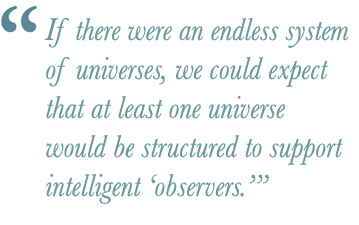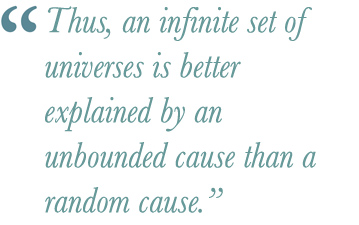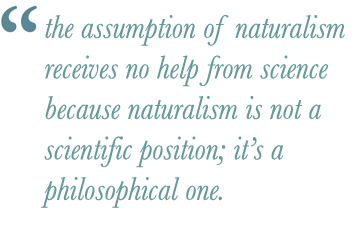Since the 1950s and 60s, fine-tuning emerged as a scientific term that refers to certain constants and quantities that appear necessary for the formation of our universe. Moreover, many have pointed out that these initial conditions of the universe exist in such a manner that they make life, including intelligent life, possible.[1] Thus, fine-tuning has been a topic of increasingly intense scientific, philosophical, and theological interest.[2]
While the term “fine-tuning” was originally religiously neutral, the appellation now incites great debate between those who view it from a theistic perspective and those who think of it as a characteristic of a naturalistic universe. The former group suggests that the existence of fine-tuning should lead us to believe that some form of intelligence has designed the universe, while the latter believe it to be an observed, yet not necessarily remarkable, feature of a universe resulting from chance.
The Possibility of Life in the Universe
“Life” means that an organism has the capacity to take in food, extract energy, grow, adapt to its environment, and reproduce. Thus, when scientists talk about a universe being “life-permitting,” they mean that the conditions that give rise to life must exist if we are to observe life at all, let alone in any specific location in the universe. The existence of life-permitting conditions doesn’t mean that life will necessarily arise; it means only that there exist conditions that make it possible.
The anthropic principle asserts that the possibility of observing life in our universe can only occur in a universe capable of supporting intelligent life. And since the Earth contains intelligent life (e.g., humans), the universe is obviously life-permitting, and therefore, we shouldn’t be surprised to observe such beings.[3]
What is Fine-Tuning?
Within the context of a life-permitting universe, fine-tuning refers to “the claim that the laws of nature, the fundamental parameters of physics, and the initial conditions of the universe are set just right for life to occur.”[4] In other words, certain physical constants and quantities must exist within an exceedingly narrow range to enable the appearance of life. As physicist Luke Barnes states: “In the set of fundamental parameters (constants and initial conditions) of nature… an extraordinarily small subset would have resulted in a universe able to support the complexity required by life.”[5]
There are three commonly-mentioned categories of fine-tuning in the universe: (1) the fine-tuning of the laws of nature (e.g., gravitational force, strong nuclear force), (2) the fine-tuning of the constants of physics (e.g., the gravitational constant G, electromagnetic constant), and (3) the fine-tuning of the initial conditions of the universe (e.g., low entropy state).[6]
Many have suggested that even the tiniest change to any constants or quantities would have resulted in a universe incapable of supporting life. For example, if the gravitational fine structure constant (a measure of the strength of the interaction between charged particles and the electromagnetic force) had been slightly smaller, existing matter would have expanded too far and too fast to form stars and planets. Hence, no life could have formed. On the other hand, if the gravitational value was too large, the universe would have collapsed on itself, and the stars would have burned out too quickly to allow the evolution of life.[7] Moreover, if the electromagnetic force did not exist, there would be no complex chemistry.[8] The chemicals essential for life would be too unstable to allow proper bonding, and there would be insufficient carbon and oxygen to support life.
While many believe that the observed parameters seem sufficiently fine-tuned to allow for intelligent life, others have suggested that there is no way to scientifically test the effect of fine-tuning since there is no way to adjust the values. As physicist Sabine Hossenfelder stated, a fine-tuned universe represents “an observational constraint on our parameters.”[9] In other words, our knowledge of fine-tuning is interesting but is of limited scientific value since the parameters cannot be changed to observe the consequences.
With so many views regarding the significance (or insignificance) of fine-tuning, it seems prudent to understand the different explanations for fine-tuning. The rest of this paper will discuss possible solutions to the fine-tuning problem.
What is the Best Explanation for a Fine-Tuned Universe?
Virtually no scientists dispute the science behind fine-tuning. What they dispute is what it all means. There are three popular explanations for a life-permitting universe: (1) the multiverse hypothesis, (2) single-universe naturalism (i.e., the claim that fine-tuning is a brute fact of a universe brought about by chance), and (3) theism (i.e., the design hypothesis).[10]
The Multiverse Hypothesis
Explanation. This hypothesis proposes the existence of a vast, if not infinite, number of universes with different initial conditions and fundamental boundaries of physics or perhaps even different laws of nature.[11] If there were an endless system of universes, we could expect that at least one universe would be structured to support intelligent “observers.” Thus, we shouldn’t be surprised to find embodied conscious agents somewhere in a multiverse; it is enough to know that humans were randomly selected to live in a universe that supports intelligent life.
Evaluation. One problem with the multiverse hypothesis is that no scientific evidence supports it. If multiple universes exist, they are unobservable since, according to physicist Sabine Hossenfelder, any universes outside our own are “causally disconnected from us.”[12] Hossenfelder concludes: “The vast majority of multiverse ideas are presently untestable, and will remain so eternally.”[13] With no data forthcoming, one cannot test a hypothesis, and without observation and testing, there is no way to generate scientific evidence to support a multiverse hypothesis. Ultimately, the multiverse explanation is not a scientific hypothesis; it is a philosophical (i.e., metaphysical) one. Philosophical questions such as the multiverse hypothesis lie outside the purview of traditional scientific methods and must be justified in some other manner.
A second problem with this hypothesis is that the appearance of life in multiple universes would be just as improbable as in our own. By examining the finely tuned properties of our own universe, many scientists have concluded that the appearance of life is incomprehensibly improbable. If all universes in a multiverse are causally disconnected, then the probability of achieving life in one universe is no different than any other. For each independently functioning universe in a multiverse, there would be an infinite number of possibilities for the initial constants. Every time you roll a die, you get the same probability of seeing any number. Similarly, every time a new universe appears, the probability that the constants and quantities will be finely tuned for life is the same: extremely improbable.
Advocates of the multiverse often posit a fundamental connection between the universes. They propose a universe-generating mechanism that explains the origin of all universes in a multiverse.[14] By postulating a universe generator, proponents think that it may increase the probability of a life-friendly universe somewhere in the multiverse.[15] However, the cosmologies that are responsible for generating multiple universes (i.e., string theory and inflationary cosmology) are highly speculative theories that invoke mechanisms that themselves require fine-tuning.[16] Thus, the multiverse hypothesis cannot explain fine-tuning without appealing to speculative theories as well as to a prior fine-tuning mechanism (either the universe generator or whatever generated the generator). This leads to an infinite regress problem: an egg without a chicken.
For example, suppose one tries to explain the design of a car by referring to the assembly plant that produces the car. An assembly line in a plant that produces a car does not alleviate the need to explain the design of the car. If anything, it merely points to the need for an explanation of the design of the assembly plant that produces the cars. In other words, it shifts the explanation to a prior level. This multiverse approach lacks an explanation for the source of all prior fine-tuning processes.
Finally, even if a multiverse does exist, the design hypothesis may provide a better explanation than naturalism. Since there is no good reason to believe that a multiverse must be randomly caused, and since a proposed multiverse adds complexity to the cause of fine-tuning, a simpler explanation seems more likely: an intelligent rational being could have caused the multiverse and made possible the appearance of other rational beings.
Single-universe Naturalism
Explanation. Single-universe naturalism does not rely on the existence of a multiverse. These naturalists claim that there is nothing surprising about the fact that we find ourselves in a universe with rational beings because nothing else is possible. Only in a universe that supports life can there be beings capable of observing and reflecting upon fine-tuning. Single-universe naturalists see a life-permitting universe as a brute fact that requires no further explanation. No one would be alive to comment on fine-tuning if the universe was not life-permitting. Therefore, the existence of human observers is to be expected and is unremarkable.
Naturalists who see fine-tuning as a brute fact say we don’t need to search for a deeper or more fundamental explanation: The universe “just is.” If the existence of fine-tuning in the universe is the result of chance, then any arrangement of matter and, ultimately, the appearance of life is equally improbable (or probable). There is no deeper meaning.
Evaluation. First, to say that fine-tuning “requires no further explanation” is a matter of opinion. Undoubtedly, many people seek deeper explanations than are readily available. And to say that human existence is “unremarkable” is, at best, arguable.
Second, a belief that fine-tuning is merely a brute fact typically assumes the truth of philosophical naturalism (henceforth, “naturalism”).[17] However, assuming philosophical naturalism does not make it true. To think otherwise is to be guilty of circular reasoning.
Moreover, naturalism receives no help from science because it is not a scientific position; it is a philosophical one. To assume the truth of naturalism amounts to nothing more than a “naturalism-in-the-gap” belief.[18] Single-universe naturalism is a belief that requires evidence and arguments to demonstrate its rationality.
Whenever someone assumes the truth of philosophical naturalism, they naturally begin to reject anything and everything that does not fit their predetermined viewpoint. As candidly admitted by evolutionary biologist Richard C. Lewontin (1997), many people take the side of naturalism simply because of a prior commitment:
It is not that the methods and institutions of science somehow compel us to accept a material explanation of the phenomenal world, but, on the contrary, that we are forced by our a priori adherence to material causes to create an apparatus of investigation and a set of concepts that produce material explanations, no matter how counter-intuitive, no matter how mystifying to the uninitiated.[19]
The Design Hypothesis
Explanation. For many theists, it is unsurprising that the universe is fine-tuned for intelligent life. After all, if an intelligent being wanted to create a world where intelligent life exists, it seems reasonable that such a being would set the initial conditions and physical constants of the universe to favor that outcome. A finely tuned universe—one that supports intelligent, self-reflective, rational beings—is perfectly consistent with a theistic explanation. It is a coherent and simple explanation that need not appeal to unnecessary conjectures (e.g., the multiverse) to support its case.
Theists (specifically monotheists) have historically believed that God created the universe and populated it with all forms of life including intelligent life. This has inspired many theists, as well as non-theists, to seek answers to the “how” question through the study of biology, chemistry, and physics. In a theistic world, the Designer could have used any number of methods to ensure the establishment of intelligent life, including a fine-tuned single universe or a multiverse.
Evaluation. Like the multiverse and chance hypotheses, theism cannot be proven scientifically; the theistic explanation is not a scientific position but a philosophical one. Nevertheless, many philosophical/theological arguments favor theism, while naturalism has very few positive arguments. The success of theism depends on a better explanation of the existence of fine-tuning than the other two hypotheses. Some of this evidence has already been shown in the above sections.
Theism receives support in the form of various theistic arguments, including the cosmological argument, the moral argument, the ontological argument, the teleological argument, and many others. Before a theist can be justified in believing that a designing intelligence is responsible for a fine-tuned universe, she must first show that one or more of the arguments for the existence of God are likely to be true while also showing that the multiverse and chance explanations lack sufficient credibility.
Conclusion
Each of the three explanations offered in this paper is consistent with a fine-tuned universe. However, none of these arguments can explain fine-tuning with absolute certainty. Nevertheless, this author favors the design hypothesis.
The design hypothesis suggests that the finely tuned constants and quantities of the universe favor the influence of a designing intelligence. According to physicist John Polkinghorne, the universe has possessed the potential for life since the Big Bang because of fine-tuning.[20] But why is the universe finely tuned? Polkinghorne states that the universe’s vast collection of finely tuned parameters is too precise to be a “happy accident.” He concludes that fine-tuning leads us past brute facts and toward a context of “deeper intelligibility.”[21] The late English astronomer Fred Hoyle may have said it best: “A commonsense interpretation of the facts suggests that a super-intellect has monkeyed with physics, as well as with chemistry and biology.”[22]
About the Author
David P. Diaz, Ed.D., is an independent researcher and retired college professor. His writings have ranged from peer-reviewed technical articles to his memoir, which won the 2006 American Book Award. Dr. Diaz holds a Bachelor’s and Master of Science degree from California Polytechnic State University, a Master of Arts in Philosophical Apologetics from Houston Christian University, and a Doctor of Education specializing in Computing and Information Technology from Nova Southeastern University. [back to top]
Footnotes
[1] Stephen C. Meyer, “What is the Evidence for Intelligent Design and What Are Its Theological Implications?” in The Comprehensive Guide to Science and Faith: Exploring the Ultimate Questions about Life and the Cosmos, ed. William A. Dembski, Casey Luskin, and Joseph M. Holden, (Eugene, OR: Harvest House Publishers, 2021), 143.
[2] For two classic works on fine-tuning, see Brandon Carter, 1974, in IAU Symposium, Vol. 63, Confrontation of Cosmological Theories with Observational Data, ed. M. S. Longair (Boston: D. Reidel Pub. Co.), 291; and B. J. Carr, and Martin J. Rees, “The anthropic principle and the structure of the physical world,” Nature. 278 (5705): 605–612, 1979.
[3] William Lane Craig, “Excursus on Natural Theology Part 15: The Teleological Argument,” Reasonable Faith, Defenders Class: December 18, 2015, https://youtu.be/pQHnG07r9jw.
[4] Robin Collins, “The Fine-Tuning of the Cosmos: A Fresh Look at Its Implications,” in The Blackwell Companion to Science and Christianity, ed. B. Stump and Alan G. Padgett (Blackwell Pub., 2012), 207.
[5] Luke A. Barnes, “A Reasonable Little Question: A Formulation of the Fine-Tuning Argument,” Ergo, an Open Access Journal of Philosophy 6, no. 42 (2020): 1220–57, https://doi.org/10.3998/ergo.12405314.0006.042, 1220.
[6] Robin Collins, “What Does a Fine-Tuned Universe Mean?” Closer to the Truth video, September 8, 2015, https://youtu.be/o_oIkBdA3Q4.
[7] Alister E. McGrath, Science & Religion a New Introduction, 3rd ed. (Hoboken, NJ: Wiley, Blackwell, 2020), 200–201.
[8] Collins, “What Does a Fine-Tuned Universe Mean?”
[9] Sabine Hossenfelder and Luke Barnes, “The Fine-Tuning of the Universe: Was the Cosmos Made for Us?” Premier Unbelievable? YouTube video: https://youtu.be/5OoYzcxzvvM.
[10] Robin Collins, “Modern Cosmology and Anthropic Fine-Tuning: Three approaches,” in Holder R., Mitton S. (eds) Georges Lemaître: Life, Science and Legacy. (Astrophysics and Space Science Library, vol 395, Springer, Berlin, Heidelberg, 2012), 173.
[11] Ibid., 174.
[12] Sabine Hossenfelder, Lost in Math: How Beauty Leads Physics Astray (New York, NY: Basic Books, 2020), 101.
[13] Ibid., 107.
[14] Meyer, “What is the Evidence for Intelligent Design,” 148.
[15] Ibid.
[16] Ibid.
[17] Philosophical naturalism is a materialistic/naturalistic philosophy that asserts that nothing that is supernatural or transcendent to the space-time universe exists. In other words, the natural world is the whole of reality. Philosophical naturalism should not be confused with methodological naturalism.
[18] By naturalism-in-the-gap, I mean a position in which one merely assumes the truth of naturalism or assumes that, given enough time, we will eventually see a naturalistic solution to a problem that is currently unsolved.
[19] Richard C. Lewontin, “Billions and Billions of Demons,” The New York Review of Books website (January 9, 1997). Retrieved July 14, 2023, from https://www.nybooks.com/articles/1997/01/09/billions-and-billions-of-demons/.
[20] As cited in William Lane Craig and Chad Meister, eds., God Is Great, God Is Good: Why Believing in God Is Reasonable and Responsible (Downers Grove, IL: IVP Books, 2009), 68.
[21] Ibid., 70.
[22] Fred Hoyle, “The Universe: Past and Present Reflections,” Annual Review of Astronomy and Astrophysics 20, no. 1 (1982): 1–36, https://doi.org/10.1146/annurev.aa.20.090182.000245.
